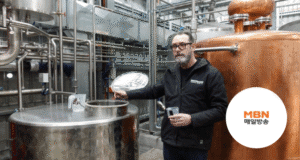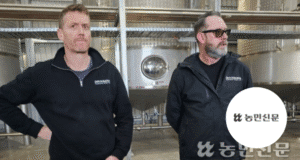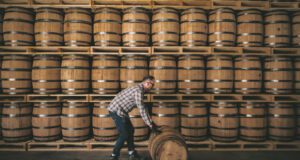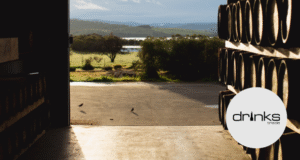Since then, the industry has flourished, with Tasmania now boasting over 50 distilleries. Taking inspiration from the trailblazing spirit of established big names like Lark and Sullivans Cove (pioneers of the island’s early 90s whisky renaissance), a handful of these new distilleries are continuing to push the boundaries by thinking outside the box.
“When I decided to start a distillery I thought, well, we could be the 70th gin in Tasmania or we could try something different,” said John Hyslop, owner of Deviant Distillery in Somerset.
Mr Hyslop launched Deviant in 2017, driven by an envelope-pushing idea: to create a whisky in just 10 weeks.
Drawing on his background as an industrial chemist, he went about creating an environment whereby the distillation process is rapidly accelerated by manipulating the physical elements of oxidation, esterification and evaporation.
The result was Anthology – a bottled spirit that tastes like a ten-year-old whisky, yet made in only ten weeks.
If it tastes like whisky, then surely it must be whisky
There was just one small catch: Anthology couldn’t legally be called whisky.
“The minimum legal requirement of ageing whisky in Australia is two years, so for that reason we called Anthology a ‘single malt spirit’,” Mr Hyslop explained.
The semantics didn’t faze his customers, with each batch of Anthology selling out within days of release.
“Making Anthology was a great learning tool, but its biggest advantage was giving us a product we could sell while we aged a traditional batch of whisky,” Mr Hyslop said.
Just out of the barrel after ageing for three years, Deviant’s first release of traditionally aged whisky will be on sale in the coming months.
So, what does the future hold for rapid-ageing experimentation?
“We’ve done some more work in the back-end and there is potential for a rapidly aged spirit to then be put into a barrel and traditionally aged for only two years. You know, a hybrid approach,” Mr Hyslop explained, “which kind of gives you the best of both worlds.”
Sustainable rye whisky?
Three kilometres north of Kempton, Belgrove Distillery is a closed-loop operation where sustainability is the name of the game.
Laying claim to Australia’s first rye whisky distillery, Belgrove was founded in fortuitous circumstances by six-generation grain farmer, Peter Bignell.
“I had a bumper crop of harvested rye grain one year, but I couldn’t find a buyer for the surplus, so I decided to build a distillery and start making whisky,” Mr Bignell explained.
With a background in engineering, Peter hand-built his own fermentation still from copper and sourced and repurposed second-hand equipment from local dairy and chocolate factories.
Mr Bignell ensures every bit of waste is utilised in his production process — the machinery is powered with biofuel from a roadhouse next to the property and the spent mash is fed to his livestock.
In 2020, Belgrove captured the attention of self-confessed whisky connoisseur Gordon Ramsay, who featured the experimental distillery in an episode of his National Geographic television series ‘Gordon Ramsay: Uncharted’.
“Gordon shovelled dried sheep s*** for me,” Peter chuckled of the memory, “which we then burnt to smoke a special batch of whisky called ‘Wholly S*** Rye Whisky’.”
Despite Ramsay’s notorious reputation, Mr Bignell insisted he is “a very nice bloke.”
“I got to meet the real Gordon. I reckon all that bluster on his other shows is just to make good TV,” Peter said.
Celebrity chefs aside, Belgrove has achieved international recognition through a number of accolades, including winning Southern Hemisphere Whisky of the Year in 2019, and being heralded as “one of the world’s great distilleries” by renowned whisky guru, Jim Murray.
However, even with Belgrove’s achievements — and the success of the local industry more broadly — Mr Bignell anticipates Tasmania still has a way to go before it can compete with the big dogs.
“Tasmania has a very good global reputation, but the size of our industry pales in comparison to Scotland, the USA, or Japan,” he said.
“A lot of the world’s whisky drinkers wouldn’t have heard of Tasmanian whisky yet, so there’s definitely potential to reach a lot more markets. But the difficulty Tasmania has at the moment is low supply.”
Pump up the volume
That sentiment is echoed by Hugh Roxburgh, co-founder of the forthcoming Greenbanks Distilling Co. – an ambitious commercial operation aiming to revolutionise contract whisky distilling in Australia.
“Tasmania has done an amazing job of building its reputation over the last 30 years by winning every award there is to win, but it’s still faced with a chronic shortage of product,” Mr Roxburgh said.
Roxburgh believes Tasmania has the capacity to be a significant player in global whisky by ramping up its production and exports, and maintains that Tasmania’s whisky evolution is similar to where Japanese whisky was two decades ago.
“In the last 20 years, Japan has gone from relative obscurity to a major force in global whisky. From 2010 to 2020, they increased their exports by a factor of 27 times, including a further 70 per cent increase in the following year,” he explained.
“They’ve achieved this by increasing their yearly production to around 200m litres of pure alcohol. Even with Tasmania home to some big brands like Lark and Sullivans Cove, we estimate it only produces around 2 million litres of pure alcohol.”
Together with his partners — former Diageo boss, Tim Salt, and head distiller, John Slattery – Roxburgh is hoping to solve this shortage of supply by building the biggest whisky distillery in Tasmania.
Currently undergoing construction in Bridgewater, 30-minutes northwest of Hobart, Greenbanks Distilling Co. will have the initial scope to produce 700,000 litres, or LALs, of pure alcohol a year, followed by 3.5m once it can upscale to 24-hour operation.
Greenbanks’ primary focus will be on contract distilling and is on track to acquire clients by the third quarter of 2023.
“We’ll be working with our customers to create whatever style of whisky they’re after, be it malted barley, rye, wheat, or a mash bill,” Mr Roxburgh said.
“We also have significant capacity to enable them to grow within the domestic and global markets.”
Roxburgh believes his company’s disruptive approach aligns Greenbanks with other local producers – a veritable ‘Tasmania vs the world’ scenario.
“We think of it as the rising tide that lifts all boats – we’ll be cheering on other Tasmanian whisky producers to success and awards because it benefits the whole industry.”









